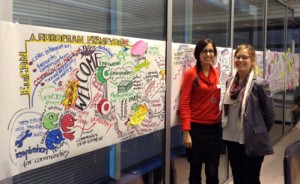EPN Report: EuCDN Final Conference of Project
Empowered Communities Active EU Citizens
EPN Team was pleased to take part in the EuCDN Final Conference on Community Development on November 20th, 2013. Representatives of European organizations and practitioners in the field of community development from various European countries were present for this event hosted by the European Economic and Social Committee.
Presentation: A European Framework for Community Development
The European Community Development Network (EuCDN) is a non-governmental European umbrella organisation created at the end of the 80’s with the aim of fighting exclusion and promoting participation and democracy through sustainable community development. Community development can be defined as the mobilisation and involvement of citizens in taking collective actions in order to strengthen and improve the living conditions of their community and empower its members.
Since September 2012, EuCDN members have been working together to build a common European framework for Community Development. The purpose of the project is to establish a common definition of Community Development, its goals, values, methods and outcomes in order to create a comprehensive understanding of what it involves for people working in this specific field.
Thanks to the support and funding from the European citizen programme, EuCDN launched a process of national conversations which further on led to an international one in which national results were shared and a final statement issued. The final step will consist of disseminating the findings of the statement in the different participating countries. The members agreed on many aspects of community development, the most important one being that collective action for collective outcomes is a fundamental process in which community development happens.
Concrete examples of community development
After the explanation of the framework, several concrete examples such as the Rainbow Neighbourhood or the Community development and Active Citizenship were presented to illustrate the project.
The people of Leopoldowo – located in a Polish neighbourhood – were facing unemployment, alcoholism, poverty and lack of perspectives. In order to overcome these difficulties, the Rainbow Neighbourhood association provided their help to improve the residents’ living conditions. To reach this goal, the Polish association organised meetings where people could express their opinion regarding the problems arising in their community. The residents quickly started to support and mobilise each other to actions. In fact, the people themselves proposed initiatives, such as repainting old buildings, in order to improve their life conditions. Rainbow Neighbourhood provided the materials so as to facilitate the process. The idea was to promote a potential oriented approach and not a problem oriented one and to let the people of the community lead themselves the process. The outcome of the initiative was quite successful. The neighbourhood was physically, socially and psychologically transformed.
The second example illustrated takes place in Belgium. Community development and Active Citizenship is a local service focused on the help provided to isolated people – older people, marginalised families and children – in rural areas. The project consists of visiting people and helping them with small tasks such as transportation for elderly people or homework for children. The volunteers then detect the main problems encountered and report them to the network coordinator of regular social services. The initiative was experimented in three communities and around 430 volunteers provided their help and support. The lessons learned could be summed up in two main points: the importance of communication among a community and the need to create a network to prevent exclusion.
Community Development: Current issues
The last part of the conference outlined the necessity of establishing a policy that can serve everyone. It is essential to create something sustainable with the citizens and the local authorities in order to tackle the problems communities are facing.Community development is increasingly required to address crucial issues such as local development, environment, poverty and inequality. Many challenges still have to be overcome. Among them the hegemony of neoliberalism, the complexity of expectations, unreasonable requirements and ideological contestation.
Throughout the day, a graphic summary of the experiences and opinions shared was conscientiously drawn, visually representing the opinions and arguments put forward by the panel of speakers who took the floor.
EPN was thrilled to attend this very interesting seminar and to have an insight on this issue which many people are nowadays not necessarily aware of. The panel of speakers presented their projects in a very clear way and defended their opinions in animated discussions.


